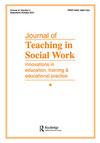Engaging Students in Social Policy and Social Justice: The Use of Candidate Debates in Canadian BSW Education
IF 0.9
Q3 EDUCATION & EDUCATIONAL RESEARCH
引用次数: 0
Abstract
ABSTRACTSocial work pedagogy recognizes the educational value of experiential learning for the professional development of social workers, with a particularly rich experiential learning literature related to clinical work and field education. This study evaluates an experiential learning activity for large undergraduate courses in another area: social policy and social justice. We ask: How effective are electoral candidate debates in building BSW students’ understanding of social justice and its relationship with social policy? Using a constructionist approach, we qualitatively analyzed reflection data from 73 students on their experiences of two in-class electoral candidate debates (one municipal, one federal) held in consecutive offerings of a first-year survey course. Findings indicate that in-class electoral debates have the potential to effectively support learning and engagement related to social policy and social justice, especially foundational concepts such as Canadian federalism, ideologies that inform policy responses, and equity analysis of different policy responses. Learning was primarily limited to formalized conceptualizations of social justice. Recommendations to maximize learning include assessment and accommodation of the diversity of prior student knowledge and inclusion of briefing and debriefing activities. The study suggests that in-class electoral debates, if done properly, can be an effective experiential teaching tool for policy courses.KEYWORDS: Social work educationsocial policysocial justiceelectoral candidate debatesexperiential learning AcknowledgmentsThis research was completed with funding provided by the School of Social Work at Carleton University.Disclosure statementNo potential conflict of interest was reported by the author(s).Notes1. Canada is divided into over 300 geographical areas called ridings or constituencies. During a federal election each riding holds an election where local candidates vie for the right to represent the region.2. First-past-the post is a voting system in which an electoral candidate is elected through simple rather than absolute majority (winner take all), i.e., the electoral candidate with the most riding votes wins the right to represent its constituents.3. UPass (or universal transit pass) is a discounted fare offered to eligible students by the university and City transportation provider. The UPass initiative was a direct result of student activism and referenda, resulting in a binding agreement between the university and the public transport authorities.Additional informationFundingThis work was supported by the Evelyn Maud McCorkell Fund, School of Social Work, Carleton University.让学生参与社会政策和社会正义:候选人辩论在加拿大BSW教育中的应用
摘要社会工作教育学认识到体验式学习对社会工作者专业发展的教育价值,与临床工作和实地教育相关的体验式学习文献特别丰富。本研究评估了另一个领域的大型本科课程的体验式学习活动:社会政策和社会正义。我们的问题是:选举候选人的辩论在培养BSW学生对社会正义及其与社会政策关系的理解方面有多有效?使用建构主义方法,我们定性地分析了73名学生在一年级调查课程中连续举行的两次班级选举候选人辩论(一次是市政辩论,一次是联邦辩论)的反思数据。研究结果表明,课堂上的选举辩论有可能有效地支持与社会政策和社会正义相关的学习和参与,特别是加拿大联邦制等基本概念,为政策反应提供信息的意识形态,以及对不同政策反应的公平分析。学习主要局限于社会正义的形式化概念。最大限度地提高学习的建议包括评估和适应学生先前知识的多样性,以及包括简报和汇报活动。这项研究表明,如果做得好,课堂上的选举辩论可以成为政策课程中一种有效的体验式教学工具。关键词:社会工作教育社会政策社会公正选举候选人辩论体验式学习致谢本研究由卡尔顿大学社会工作学院资助完成。披露声明作者未报告潜在的利益冲突。加拿大分为300多个地理区域,称为选区或选区。在联邦选举期间,每个选区举行一次选举,当地候选人争夺代表该地区的权利。简单多数制(first -past- post)是一种选举制度,在这种制度中,选举候选人是通过简单多数制而不是绝对多数制(赢家通吃)产生的,即获得最多选区选票的候选人赢得代表其选民的权利。UPass(或通用交通通票)是大学和城市交通供应商为符合条件的学生提供的折扣票价。UPass的倡议是学生激进主义和公民投票的直接结果,导致大学和公共交通当局之间达成了具有约束力的协议。本研究得到了卡尔顿大学社会工作学院Evelyn Maud McCorkell基金的支持。
本文章由计算机程序翻译,如有差异,请以英文原文为准。
求助全文
约1分钟内获得全文
求助全文
来源期刊

Journal of Teaching in Social Work
EDUCATION & EDUCATIONAL RESEARCH-
CiteScore
1.20
自引率
0.00%
发文量
36
期刊介绍:
The Journal of Teaching in Social Work fills a long-standing gap in the social work literature by providing opportunities for creative and able teachers—in schools, agency-based training programs, and direct practice—to share with their colleagues what experience and systematic study has taught them about successful teaching. Through articles focusing on the teacher, the teaching process, and new contexts of teaching, the journal is an essential forum for teaching and learning processes and the factors affecting their quality. The journal recognizes that all social work practitioners who wish to teach (whatever their specialty) should know the philosophies of teaching and learning as well as educational methods and techniques.
 求助内容:
求助内容: 应助结果提醒方式:
应助结果提醒方式:


